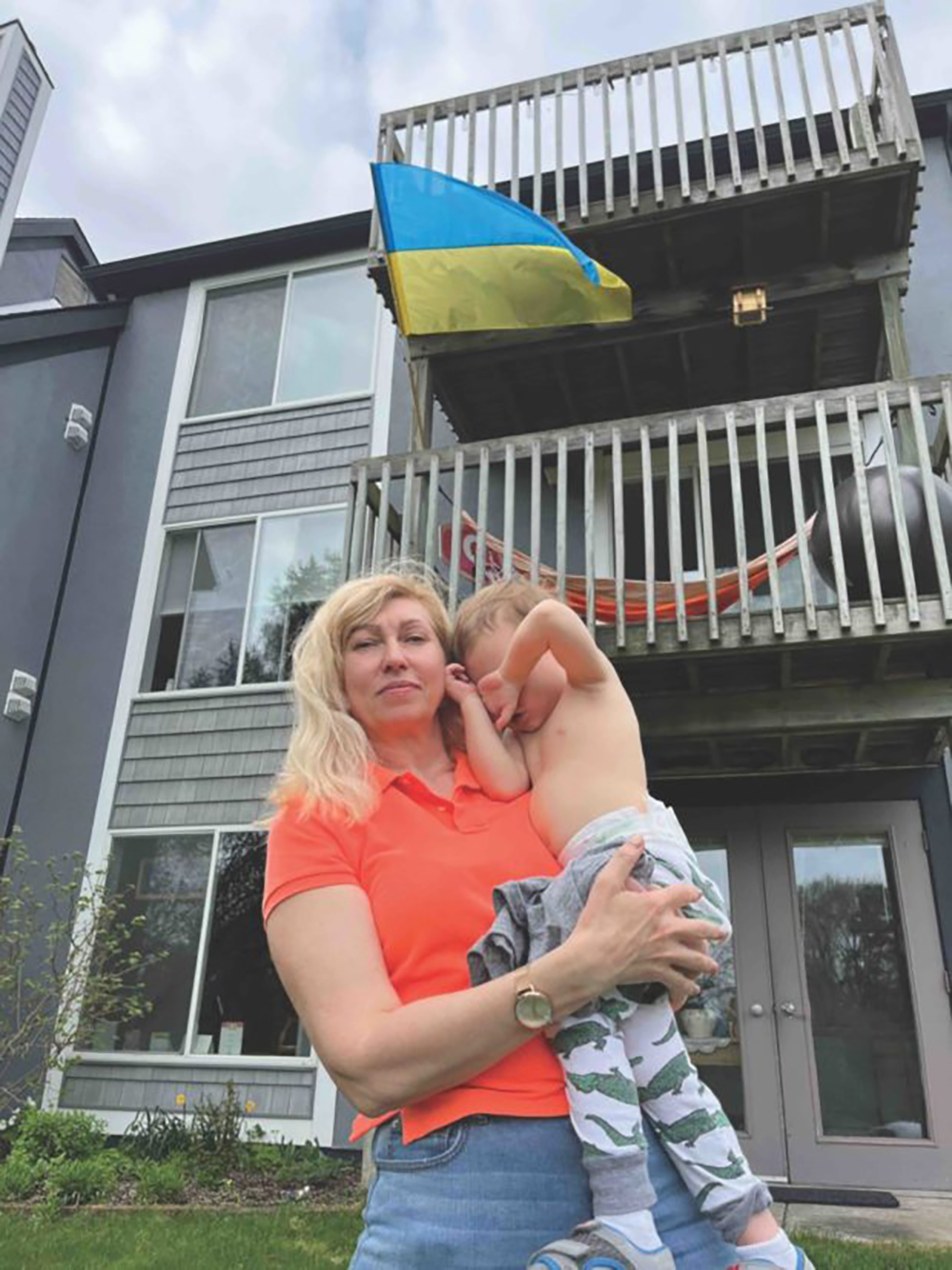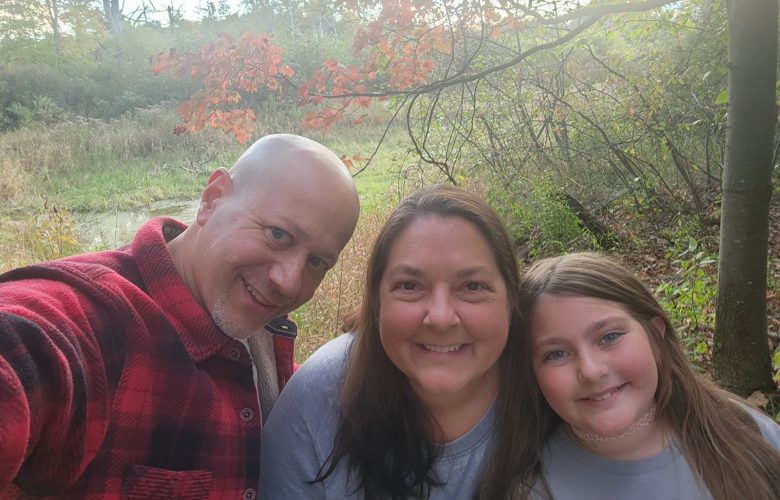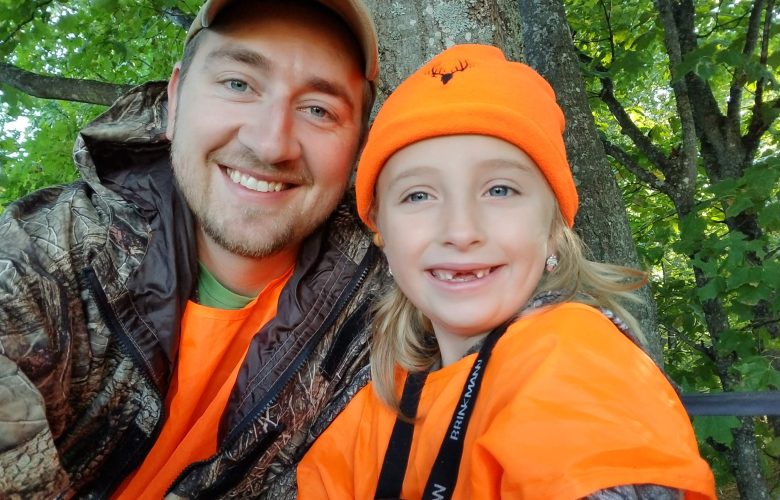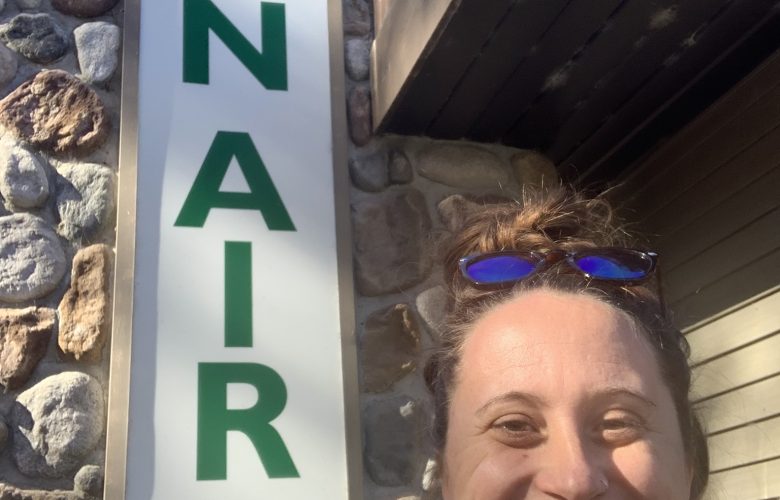Ukrainian refugee arrives in Michigan to meet her grandchildren
By Jacob Wheeler
Current Contributor
“Come here, my joy, my happiness,” Liubov Shchegelska tells her grandson, Tim, in Ukrainian as the two-year-old boy plays in the yard outside his parents’ Traverse City apartment. Tim’s parents are Viktor Grebennykov and Diana Grebennykova, natives of Ukraine who moved to Northern Michigan in 2019 when Viktor—an Olympian in the 2012 London games—became coach of the Lake Leelanau Rowing Club.
It is now early May, a bright sun warms the new grass, and the fields are ablaze with the soft pink of spring blossoms. If she ignored the grim news popping from the Telegram app on her phone, Shchegelska—who is Diana’s mother—could almost tune out the war that is ravaging her homeland. The conflict sent her across borders and into the United States just two weeks before, but it also allowed her to meet her grandchildren, Tim, and his four-year-old sister, Ellis, for the very first time.
On this day she could almost tune out the war. Almost.
Shchegelska, her sister, her son, Konstantin, and his family fled their home in Kyiv at 6 a.m. on February 24, the day that the Russians invaded. They drove 16 hours—a trip that usually takes eight hours—in a long chain of cars and buses heading west and sheltered in Kamianets-Podilskyi, a small city in western Ukraine near the Romanian and Moldovan borders, where Shchegelska’s mother lives.
Winter cold still gripped Ukraine, and the family left the capital in such a hurry that they did not bring many layers of warm clothing. Shchegelska packed a suitcase and brought some money and a small amount of jewelry with her. But in the haste to find her cat and leave before the invaders were expected to arrive, she forgot to bring her passport. The men who took her west would later return to Kyiv to volunteer for the civil defense forces—they were ultimately not needed, so they brought her key documents back to her.
She lived for nearly two months in Kamianets-Podilskyi, volunteering to help refugees find food and shelter. She spent hours on Telegram calls with Diana, Viktor, Ellis, and Tim who were here in Northern Michigan, but she had to leave the apartment sometimes five to 10 times a day to take shelter when she heard air raid sirens. During one video call, Shchegelska suddenly told the grandchildren, “We have to go to the bunker now.”
Meanwhile, Viktor’s mother and brother live near Mykolaiv, a city on the Black Sea which is under fire by the Russians as they try to take the crucial port city of Odessa and cut off Ukraine’s access to the sea.
In mid-April, after weeks of urging from her daughter Diana, Shchegelska traveled to Poland and two days later flew from Warsaw to Paris to Mexico City to Tijuana, from where she crossed the U.S. border into California on April 21 as a refugee. Twice before she had tried—and failed—to get a visa to visit the United States. On April 23, she flew from San Diego to Chicago to Traverse City, where Diana met her at Cherry Capital Airport. They touched each other and cried. Mother and daughter had not seen each other in eight years, since Viktor and Diana left Ukraine in 2014 when the Russians invaded the Crimean Peninsula and fomented a war in the eastern part of the country.
Back at their apartment near Tom’s West Bay, Viktor had prepared a midnight feast of traditional Ukraine borscht loaded with beets, cabbage, beans, onions, and potatoes for his mother-in-law. The next morning, Shchegelska met her grandchildren for the first time.
Since arriving in Michigan, Shchegelska has settled into life with her daughter’s family: cooking, shopping, going for walks, playing with the children, visiting Viktor’s rowing club at Fountain Point Resort on Lake Leelanau. They have also taken her to see iconic locations in the Sleeping Bear Dunes National Lakeshore, like Pyramid Point and Good Harbor Beach.
But Shchegelska is not a tourist; she is a war refugee.
“I’m very happy I’m in this place,” she says. “Diana said to try and leave the war behind me, but I’m always praying in my mind for our soldiers. I don’t know if I’ll ever get to go back home.”
A blue and yellow flag that Liubov brought from Ukraine hangs from their porch on the second floor of the apartment building.
“The war changed everything. In one day, your life is suddenly crossed,” says Shchegelska, who managed a small company back in Kyiv. “I stopped making plans. I hope to go back at some point, but I can’t go back before the war is over.”
Human Cost
Lake Leelanau Rowing Club coach Viktor Grebennykov and his wife, Diana—both natives of Ukraine who currently live in Traverse City— are not hiding news of the war in their homeland from their young children. But they moderate which videos and photos Ellis (4) and Tim (2) see on the television and computer screens, even as the Russian military continues its daily shelling of Ukrainian cities.
Viktor and Diana shield those young eyes from the most gruesome footage, such as images of bloodied women escaping from a maternity hospital in the Black Sea port city of Mariupol after a Russian airstrike on March 9, or trenches dug for mass graves in the besieged city of half a million, or charred bodies of a family who walked near a television tower in Kyiv which was targeted by a missile on March 1.
Nevertheless, the children comprehend the human costs of this hellish war and how it endangers family members whom they have never met but know from frequent video chats.
“My daughter [would ask] my mom, ‘Do you have enough food? Because if you don’t have enough food, you will die’,” Diana says. “The kids see us watching the news and communicating on Telegram. They come and ask us, ‘What is this? Why is this happening?’ They’re curious. It’s important for us to talk with the kids and not hide the war. Kids feel everything, they understand.”
Viktor—an Olympian and three-time world champion who competed for the Ukrainian rowing team in the 2012 London games—came to the United States in 2015 on an asylum visa. He has coached the Lake Leelanau Rowing Club since 2019 and concedes that he and Diana are “mentally not here” since the invasion began on February 24.
“We still have our jobs. We have to live our lives and stay positive with the kids,” he says. “But I think they feel that we’re not always with them. We worry about family and what’s going on in our country. It’s difficult for everyone.”
Ellis and Tim frequently video chat with their grandmothers and aunts. Viktor’s mother, Olga, and brother Konstantin live in Mykolaiv, which the Russians are trying to subdue in order to reach Odessa and sever Ukraine’s access to the Black Sea. The resistance in Mykolaiv has boobytrapped bridges into the city in order to keep out the attackers. Viktor’s brother is recovering after being shot in the leg by Russian soldiers while returning to Ukraine from his job in Poland.
Diana’s brother Konstantin was helping refugees coming from the capital and also working with the Ukrainian army to identify saboteurs and establish basement and bomb shelters.
One day, the Grebennykovas’ daughter, Ellis, grew upset because a girl she follows on YouTube who lives in the besieged city of Kharkiv in eastern Ukraine stopped posting videos.
“It’s hard to explain that,” says Viktor, who struggles to see an end in sight. “Being optimistic is not realistic. I understand the war is not going to end soon.”
Support from Rowing Community
Standing six feet seven inches tall, his body as tight as a whip, Viktor’s presence in Northern Michigan is the culmination of more than 10 years of growth at the Lake Leelanau Rowing Club, says Erik Zehender, who founded the club in 2010 at Fountain Point Resort, which he co-manages.
“He’s as good a coach as anyone in the country,” Zehender says. “There are very few rowing coaches who ‘walk the walk’ and continue competing themselves. It’s amazing to have that level of coaching here in Leelanau.”
The club launched in 2010 and quickly became a training ground for local high school athletes who would go on to row for elite colleges, including Cornell, Georgetown, Harvard, Louisville, Michigan, Michigan State, Wisconsin, and Minnesota. Standout names at the club include Glen Lake sophomore Leo Lombardi, a top U17 athlete who rowed together with Viktor last July from Glen Arbor to Empire in one hour and 40 minutes; another is Traverse City Central student Lila Miller, blind since birth, a three-time national champion in inclusive rowing.
But before Viktor took the helm in 2019, the Lake Leelanau Rowing Club cycled through many coaches and lacked stability from one year to the next.
War in his country spurred the move to the United States. Viktor was training with the Ukrainian national team in 2014 in Crimea when the Russians launched a covert effort to seize and occupy the peninsula. Then age 28, he described it as the moment he reconsidered his future plans.
He and Diana moved to Florida the following year. There, a former teammate helped him to land a job coaching and competing for the Miami Rowing Club. He met Zehender in 2018 at a regatta in Chattanooga, Tennessee, and he interviewed for the part-time coaching job in Lake Leelanau.
To make ends meet, Viktor has worked the reception desk and done whatever odd jobs are needed at Fountain Point, as well. He has also worked construction, been an Uber driver, and is currently a personal trainer at the Traverse City Country Club.
“I need to survive, make a living, and support my family,” he says.
Meanwhile, Diana—a professional gymnast in Ukraine—coaches gymnastics and also works as a personal trainer when she is not home with the children.
Zehender considers the Grebennykovas part of the Fountain Point family. The resort co-owner fondly remembers when their son, Tim, crawled across the resort’s lawn and used the support of his leg to stand up.
“What’s happening in Ukraine is so overwhelming and heartbreaking,” Zehender says. “The best way we can help is by making sure Viktor’s family is supported, so they can send support to people back home. The more rowers who join the club, the more we can support him.”
“Our Life Is A Movie”
Within their own family, Viktor and Diana Grebennykov represent Ukraine’s linguistic and cultural diversity. Viktor’s mother, Olga, is an ethnic Russian who grew up in Kamchatka, in the country’s far east. His father, Alexandr—a Ukrainian who was also a rower—died of cancer last year.
Viktor says that, if he were there today, he would join the citizen resistance and fight. Athletes on Ukraine’s national sports teams are often affiliated with the military: Viktor, himself, served in the military police. Some of his rowing brethren in Ukraine have enlisted to fight the Russians.
Meanwhile, Diana’s mother, Liubov Shchegelska, is half-Polish and feels an orientation toward the West. She is outspoken in her criticism of Russian President Vladimir Putin and the danger she feels that he poses to the Western world.
“The Ukrainian people are protecting the world with our blood,” says Diana, whose family was not surprised by the Russian invasion; they were ready for it and left Kyiv on February 24.
On social media, Diana has called on the United States and NATO to escalate their role in defending Ukraine by establishing a no-fly zone over cities.
U.S. President Joe Biden and Western leaders have stated that they will defend every inch of NATO territory from Russian aggression but will not send ground troops or airmen into Ukrainian territory—doing so could lead to a direct standoff between the United States and Russia, two nations with nuclear weapons.
Diana laments that many Americans do not recognize the calamity happening in Europe in real time, which is causing the fastest refugee crisis since World War II.
“Mentally I’m not here,” she says. “I go to the store and I see people smiling at each other. I hear nice music from the speakers and people enjoying their lives. To them, the lives of Ukrainian people right now is a movie. People in the U.S. are just watching while my people are dying.”
Though the situation grows bleaker by the day, Diana’s face lights up at the mention of Volodymyr Zelensky, Ukraine’s embattled president who has stayed behind with his troops in Kyiv to rally his countrymen and women with nightly Facebook Live addresses to the beleaguered nation. Unshaven and haggard, sporting the same olive-green military t-shirt night after night, Western leaders and Western media have dubbed Zelensky a modern-day Winston Churchill.
“He’s my hero right now,” Diana says. “In the movies, we saw a superhero or a batman. No, Zelensky is the real hero. He’s very tired, but a truthful hero.”
This article is an amalgamation of two articles first published in the Glen Arbor Sun, a Leelanau County-based semi-sister publication to The Betsie Current.
Featured Photo Caption: Liubov Shchegelska and her two-year-old grandson, Tim. Photo courtesy of the Glen Arbor Sun.




